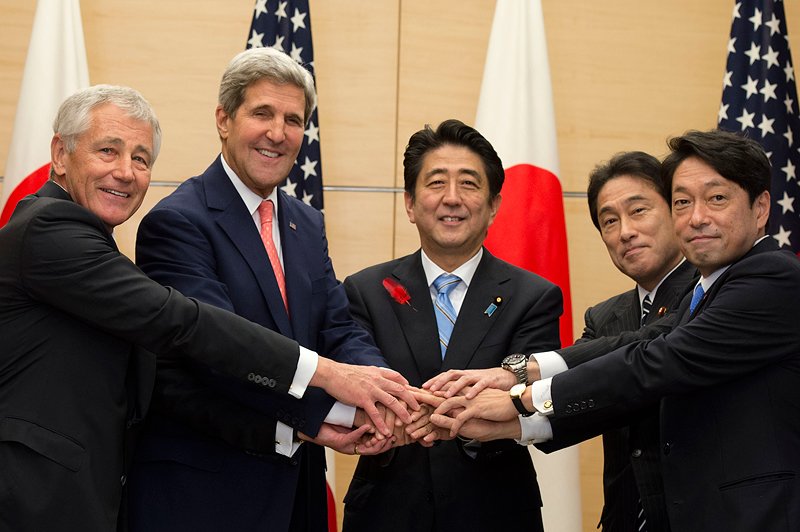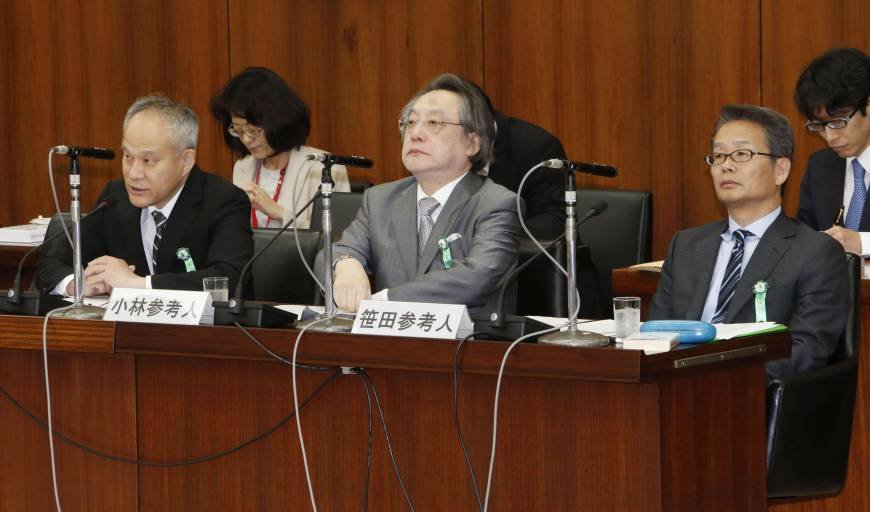Speaking in February on a panel with Judge Shunji Yanai, on the constitutional and international law issues arising from the Japanese government’s “reinterpretation” of the war-renouncing Article 9 of the Constitution. Shunji Yanai, who is a judge on the International Tribunal for the Law of the Sea, was the chairman of the Advisory Panel on the Reconstruction for the Legal Basis of Security, which made recommendations to the Japanese government on how and why to “reinterpret” Article 9. The one-day conference was held at the Asser Institute in The Hague, with Judge Hisashi Owada of the International Court of Justice giving the keynote address.
Article 9
Questioning U.S. Support for Japan’s National Security Moves
(Published in JURIST – Forum, Sept. 2, 2015)
 On August 30, tens of thousands of Japanese citizens demonstrated outside of the Diet (parliament), and in other cities across Japan, protesting against draft national security legislation that would expand the permissible operations of the Self-Defense Forces (SDF). The bills are the culmination of an effort by Prime Minister Shinzo Abe to expand Japan’s role in international collective security efforts. To do so, however, the government has sought to “reinterpret” Japan’s constitutional limits on the use of military force, in a manner that circumvents the formal constitutional amendment process, and thereby undermines the rule of law and constitutionalism in Japan.
On August 30, tens of thousands of Japanese citizens demonstrated outside of the Diet (parliament), and in other cities across Japan, protesting against draft national security legislation that would expand the permissible operations of the Self-Defense Forces (SDF). The bills are the culmination of an effort by Prime Minister Shinzo Abe to expand Japan’s role in international collective security efforts. To do so, however, the government has sought to “reinterpret” Japan’s constitutional limits on the use of military force, in a manner that circumvents the formal constitutional amendment process, and thereby undermines the rule of law and constitutionalism in Japan.
It is this process as much as the substance of the bills that has provoked the protests and triggered a constitutional crisis in Japan. Yet these developments have been largely welcomed in US policy circles. The objectives may be in America’s short-term interest, but a deeper understanding of the issues and a longer-term perspective would caution against US endorsement of this illegitimate process.
Constitutional Background
To understand the issues one has to begin with the constitutional limits. Article 9 of the constitutionrenounces war as a sovereign right of the nation, and the threat or use of force for the settlement of international disputes (Art. 9(1)). It also prohibits the maintenance of armed forces or other war potential (Art. 9(2)). These provisions have been consistently interpreted by the Cabinet Legislation Bureau (CLB) (which is loosely analogous to the US Office of Legal Counsel) and successive governments since the early 1950s, as meaning that Japan was entitled to use force for individual self-defense in the event of an armed attack on Japan; and that Japan was thus entitled to maintain a minimum level of armed forces necessary for such defense. This understanding was also implicitly confirmed by the Supreme Court in the Sunagawa decision, the only decision it has rendered on the issue. But the CLB has also clearly maintained that Art. 9(1) means that Japan is prohibited from any participation in collective self-defense as authorized by Article 51 of the UN Charter, or other collective security operations as authorized by the UN Security Council under Articles 39 and 42 of the UN Charter.
Interview in AERA Magazine on Art. 9 and Revisionist History
This interview, titled (roughly) “Speak Out Against the ‘It Can’t Be Helped’ Way of Thinking”, was published in the August 10, 2015 issue of AERA, Japan’s highbrow weekly newsmagazine. It was a special issue devoted to the 70th Anniversary of the end of World War II. It unfortunately attributes some of the comments I made in relation to Article 9 of the Constitution, and how the public should respond to efforts of the current government to reinterpret that provision, to my views on Prime Minister Abe’s tendencies towards revisionist history.
Media Should Stop Legitimizing Abe’s Article 9 ‘Reinterpretation’
(Published in The Japan Times, Jun. 13, 2015).
Three of Japan’s preeminent constitutional law scholars testified on June 4 that the government’s recently tabled national security bills were unconstitutional. The proposed legislation is intended to implement the Cabinet resolution that purports to “reinterpret” the war-renouncing provision of the Constitution. The legal scholars’ testimony was greeted with apparent surprise in the media, as though it had not occurred to anyone until that moment that the draft bills might be unconstitutional.
The media reporting on the so-called reinterpretation has reflected a profound misunderstanding of the constitutional effect of the Cabinet resolution ever since it was issued last summer. The press has typically stated that the meaning of Article 9 had been “changed” or “revised” by the Cabinet resolution. That is simply wrong as a matter of law. It is important that the media understand that the Constitution was not amended or changed in any way by the Cabinet resolution, and that laws must continue to be judged against long established interpretations of Article 9. Otherwise, misleading and mistaken reporting on the issue could contribute to making an illegitimate attempt at reinterpretation a de facto amendment.



